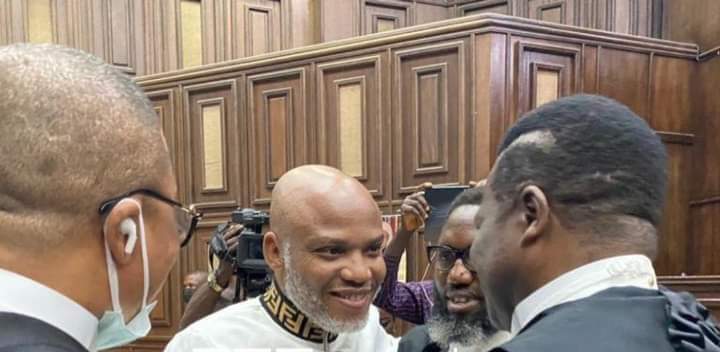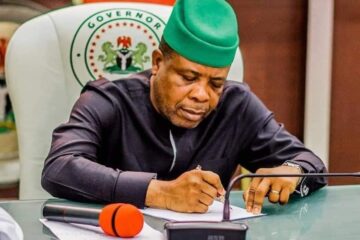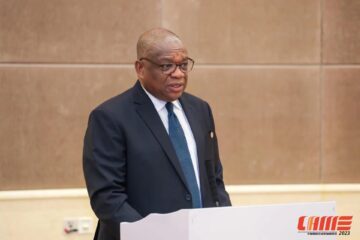The Federal High Court in Abuja, on Wednesday, adjourned the trial of Nnamdi Kanu, leader of the Indigenous People of Biafra (IPOB), until February, after the secessionist was re-arraigned on fresh charges filed against him by the Nigerian government.
The federal government filed an amended 15-count charge against him on Monday.
Mr Kanu was accused of various offences, including treasonable felony and terrorism, offences he allegedly committed in the course of his separatist campaigns.
He was initially scheduled to be re-arraigned before the court on Tuesday, but the judge, Binta Nyako, had to adjourn the case after the defence team complained about the late service of the amended charges on them.
Mr Kanu pleaded not guilty to all 15 counts read to him on Wednesday.
After the plea taking, the prosecutor, Shuiabu Labaran, urged the trial judge, Mrs Nyako, to order the trial to commence.
The Nigerian government lawyer said there were two prosecution witnesses in court on Wednesday for the trial to begin immediately.
But Mr Kanu’s lawyer, Mike Ozekhome, a Senior Advocate of Nigeria (SAN), objected to the commencement of trial, arguing that his client’s two pending applications challenging the validity of the charges must first be taken and determined.
“I am surprised that the prosecution was telling the court that it was ready to go on with the trial,” Mr Ozekhome said.
IPOB leader, Nnamdi Kanu arrives Federal High Court in Abuja in continuation of his trial on Wednesday.
IPOB leader, Nnamdi Kanu arrives Federal High Court in Abuja in continuation of his trial on Wednesday.
He argued further, “We have served the prosecution with two fundamental documents. We have generated a preliminary objection. We urge the court to discharge and acquit the defendant because there is no basis for the charge to stand.
“We cannot go into trial without addressing the pending applications.
“The very applications are fundamental and intrinsic to the hearing and determination of the 15-count charge.”
Responding, Mr Labaran said he had just been served on Wednesday with the applications seeking to quash the charges as well as the defendant’s bail.
“You cannot file a process on the same day and it will be heard. Constitutionally, we have a right to look at the court papers and see whether to reply or not,” the government lawyer argued.
But the judge was not disposed to entertaining Mr Kanu’s bail application, saying, “I can’t hear the bail application for now.”
Mrs Nyako, however, agreed with the defence lawyer that “his application must be heard and determined first, whether the charges are defective or not.”
She then adjourned the case until February 16.
History of charges amendment
The Biafra nation agitator who was first arrested in 2015 over his separatist activities has been re-arraigned before different judges of the Federal High Court in Abuja after the first set of charges were filed against him and his former co-defendants on December 18, 2015.
Mrs Nyako took over the case in 2016 after three judges – Ahmed Mohammed, and John Tsoho (the current Chief Judge of the Federal High Court) – had previously handled it.
IPOB leader, Nnamdi Kanu arrives Federal High Court in Abuja in continuation of his trial on Wednesday.
IPOB leader, Nnamdi Kanu arrives Federal High Court in Abuja in continuation of his trial on Wednesday.
The previous judges withdrew from the case at different times following Mr Kanu’s allegation of bias against them.
The charges were later amended after Mrs Nyako, who took over the case after Mr Tsoho, struck out six of the 11 counts on March 1, 2017.
Mrs Nyako later granted bail to Mr Kanu in April 2017. But months later, the defendant fled the country after soldiers invaded his home in Abia State in September 2017.
On March 28, 2018, following Mr Kanu’s continued absence from court, the judge separated his trial from that of his four other co-defendants.
Exactly a year after, on March 28, 2019, the judge ordered Mr Kanu’s arrest and directed that his trial on charges of treasonable felony would proceed in his absence.
The case against Mr Kanu comprising seven charges did not make any progress until he was arrested abroad and returned to the country by the federal government in June 2021.
The federal government filed amended charges raising the number of counts from seven to 15 to incorporate terrorism offences he allegedly committed through broadcasts while he was abroad.
Amended charges
The Nigerian government served the amended 15-count charge on Mr Kanu’s legal team on Monday.
The charges centre on Mr Kanu’s separatist activities.
In the court document signed by the Director of Public Prosecution of the Federation, Mohammed Abubakar, the IPOB leader was accused of making “a broadcast received and heard in Nigeria and in furtherance of an act of terrorism against the Federal Republic of Nigeria and the people of Nigeria.”
The said broadcast, according to the prosecution, was intended to “destabilise the fundamental political and economic structures of Nigeria.
“You incite the members of the public to stop the Anambra State Elections, and you thereby committed an offence punishable under section 1 (2) (h) of the Terrorism (Prevention) (Amendment) Act 2013,” Count nine of the charge read.
In count 10, the charge said, “between 2018 and 2021, that you Nnamdi Kanu of Afara-Ukwu Ibeku, Umahia North Local Government Area of Abia State on diverse dates, made a broadcast received and heard in Nigeria within the jurisdiction of this court, in furtherance of an act of terrorism against the Federal Republic of Nigeria, you incite members of the public to destroy public facilities and you thereby committed an offence punishable” under the Terrorism Prevention Act.
Similarly, in count five, the IPOB leader was accused of inciting “members of the public in Nigeria to hunt and kill families of Nigerian security personnel and that you thereby committed an offence punishable under Section 1 (2) of the Terrorism Prevention Amendment Act, 2013.”




